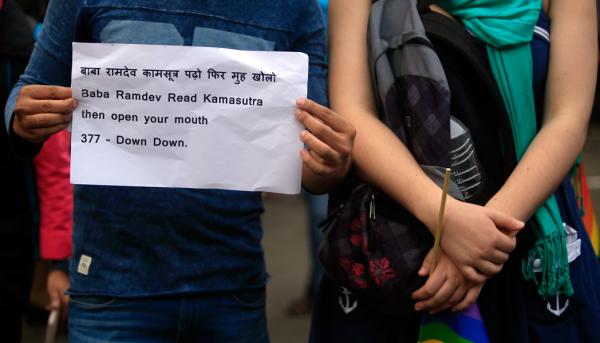
Keeping hopes alive for the queer community, the Supreme Court on Tuesday agreed to re-examine its 2013 verdict on homosexuality and referred the matter to a five-judge Constitution bench.
Former Union Minister and lawyer Kapil Sibal, who appeared for the petitioners, is reported to have told the bench - headed by Chief Justice TS Thakur - that since the issue was a constitutional matter, only a constitutional bench can hear the case.
The SC was hearing a curative petition filed by gay rights activists and the NGO Naz Foundation against the top court's 11 December 2013 judgement upholding validity of section 377.
A number of vigils and rallies have been held across the country ahead of the decision.
Section 377: A colonial law
This section in Chapter XVI of the IPC deems any sexual activity that is 'against the order of Nature' as being a criminal act. The law states that those who voluntarily engage in carnal intercourse 'against the order of Nature with any man, woman or animal shall be punished with imprisonment for life or for a term which may extend to 10 years and also be liable to a fine'.

Photo: Vikas Kumar/Catch News
Surprisingly, prior to the British rule in India, there was no law criminalising sexual practices.
According to Naz Foundation, Section 377 poses a danger to the community as the law seeks to criminalise a person's sexual identity and expression - putting them at the risk of extortion, blackmail and harassment.
This is also a major reason why many from the LGBTQI community often shy away from being tested for STDs - including the HIV virus - for fear of discrimination and prosecution.
A long struggle for basic rights
It was in the year 2001 that a Lawyers Collective - on behalf of the Naz Foundation - filed a writ petition in the Delhi High Court challenging the constitutionality of Section 377.
The petition was filed on the grounds that the draconian law grossly violates the right to privacy, dignity and health under Article 21, equal protection of law and non-discrimination under Articles 14 and 15 and freedom of expression under Article 19 of the Constitution.

Photo: Vikas Kumar/Catch News
In 2009, the Delhi High Court, much to the relief of the LGBTQI community passed a judgement that Section 377 was indeed in violation of Articles 21, 14 and 15 of the Constitution as it criminalised the private sexual acts of consenting adults.
But the Supreme Court chose to reverse the verdict in December 2013. Upholding the constitutional validity of Section 377 IPC, an SC bench - headed by Justice GS Singhvi (since retired) - declared that the Delhi Court could not have a say in the matter and that it was up to the Parliament to amend or strike down the law.
The politics surrounding the issue
Political parties have been displayed varied stands on the issue. The ruling BJP, which previously applauded the Supreme Court's 2013 verdict upholding Section 377 now appears to support the Delhi High Court's decision to de-criminalise consensual homosexual acts in private.
In November 2015, Finance Minister Arun Jaitley spoke at the Times Litfest about Section 377 and urged that the Supreme Court review its decision to criminalise homosexual acts. Jaitley's views also found support from senior Congress leader P Chidambaram.
Congress man Shashi Tharoor took to social media to raise awareness about the issue. He also signed petitions and introduced a private bill seeking to allow adults to have consensual non-vaginal sexual intercourse - but it was almost immediately rejected without being introduced.


![BJP's Kapil Mishra recreates Shankar Mahadevan’s ‘Breathless’ song to highlight Delhi pollution [WATCH] BJP's Kapil Mishra recreates Shankar Mahadevan’s ‘Breathless’ song to highlight Delhi pollution [WATCH]](https://images.catchnews.com/upload/2022/11/03/kapil-mishra_240884_300x172.png)

![Anupam Kher shares pictures of his toned body on 67th birthday [MUST SEE] Anupam Kher shares pictures of his toned body on 67th birthday [MUST SEE]](https://images.catchnews.com/upload/2022/03/07/Anupam_kher_231145_300x172.jpg)






